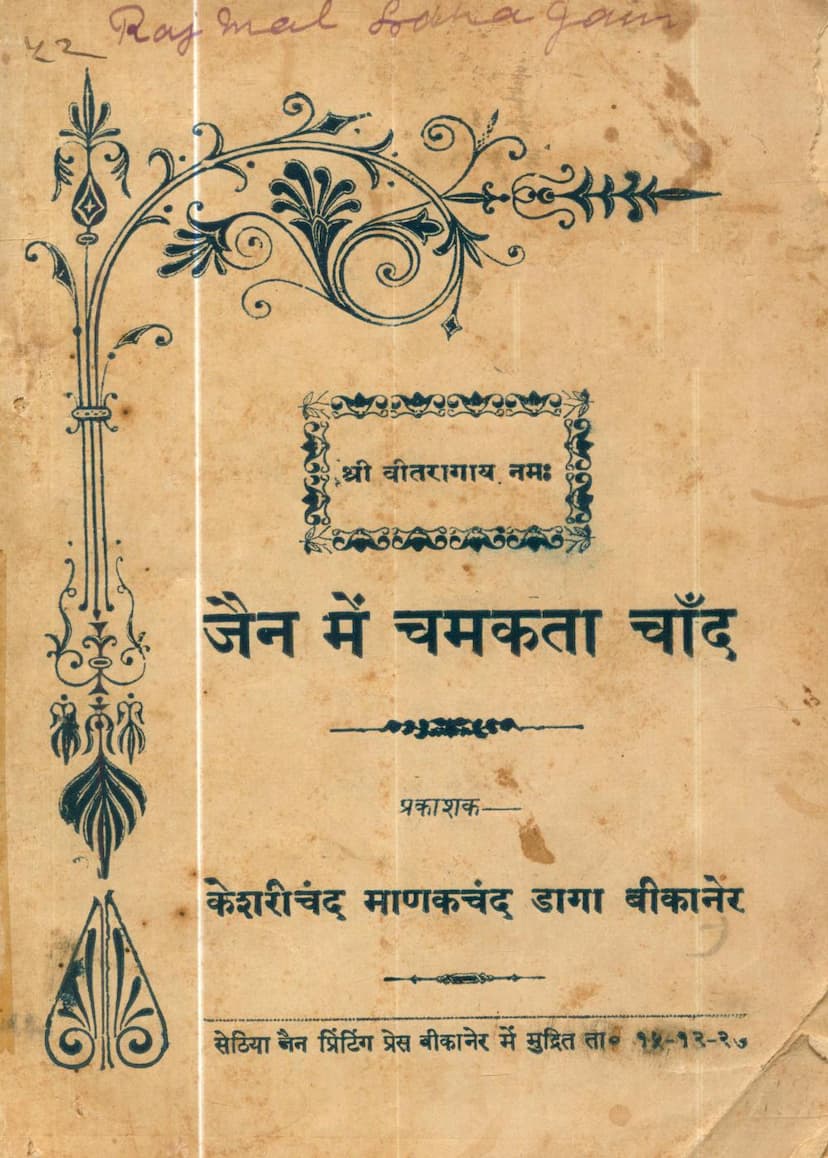Jain Me Chamakta Chand
Added to library: September 2, 2025

Summary
This document is a compilation of praise and teachings related to Muni Jawahirlalji, a prominent Jain Acharya. The book, titled "Jain Me Chamakta Chand" (The Shining Moon in Jainism), was compiled and published by Kesharichand Manekchand Daga of Bikaner. This is the second edition, indicating its popularity and demand.
Here's a breakdown of the content:
Core Subject: The book is a tribute to Muni Jawahirlalji, highlighting his virtuous qualities, extensive knowledge, and contributions to Jainism and society.
Key Themes and Content:
- Praise for Muni Jawahirlalji: The central theme is the veneration of Muni Jawahirlalji. He is described as a "head of the Jain religion," a great scholar, an expert in Sanskrit, a propagator of knowledge, and a reformer of the nation.
- Physical Condition and Austerity: The text mentions that Muni Jawahirlalji has been consuming very little food for six years due to his health, subsisting mainly on milk and curd. He is deeply devoted to "Parbrahma Paramatma" (the supreme divine entity).
- Teaching Style and Inclusivity: His teachings are described as enchanting and attractive, drawing thousands of people from other religious backgrounds. Importantly, he does not criticize other faiths.
- Social Reform: Muni Jawahirlalji is credited with resolving disputes within communities and persuading untouchable castes to abstain from alcohol and other vices.
- Disciples: His main disciples, Pandit Ratnamuniji Maharaj Ghasilalji and Ganeshlalji, are praised for their knowledge of Sanskrit and their practice of celibacy. They are also noted for their continued pursuit of knowledge despite their advanced learning.
- Other Ascetics and Their Practices: The book also mentions the penances of other ascetics, such as Muniharat Sundarlalji (two months of fasting) and Muniharat Kesharimalji (three months and five days of fasting), emphasizing the rigor of their spiritual practices.
- Advocacy for Jain Principles: Muni Jawahirlalji's teachings promote principles like dandadan (charity), paropkar (benevolence), and ahimsa (non-violence) as his core duties. He also advocates for cow protection.
- Social and Political Context: The book touches upon the positive societal impact attributed to the blessings and efforts of various dignitaries, including Maharaja Ganga Singhji of Bikaner and his son, Thakur Shardul Singhji. The arrival of the Viceroy and other high officials for the inauguration of a canal in Ganganagar is also mentioned, signifying a period of progress.
- Conference and Key Figures: An eighth session of a conference is mentioned, with tributes to key figures like Vadi Lalji Bhai (a religious preacher and scholar), Nathmalji Choradia (who renounced wealth for national upliftment), Milapchandji Vaid (who took responsibility for conference expenses), Babu Anandrajji Surana (who disseminated conference information), Kani Ramji, and Bahadurmalji Banthia (who planned to open a school for the upliftment of untouchables).
- Philanthropy and Community Support: The book highlights the efforts of individuals like Anandmalji Shrimall, Hazarimalji Mangalchandji Malu, and Satidasji Tathed for their religious counsel and amiable nature. It also mentions the late Laxmichandji Daga, a benefactor who opened a charitable dispensary, and his sons, Kesharichandji and Manikchandji, from whom much is hoped.
- Call to Action for Jains: The author, Master Jawaharmal Sharma, implores Jain brothers to value their time, foster mutual love, discard laziness, engage in good deeds, dedicate themselves to their religion, promote education, and uphold unity. He stresses the importance of the eternal nature of Jainism and the need to avoid past disputes and internal conflicts.
- Author's Humility: The author expresses his humility, stating he is an ordinary person who teaches business-related English and Hindi to the sons of wealthy individuals. He attributes the inspiration for this book to his deep respect for Muni Jawahirlalji.
- Poetic Tributes: The latter part of the book includes devotional songs (ragas) in praise of Muni Jawahirlalji. These songs highlight his virtues, his asceticism, his role as a spiritual guide, and his contributions to social reform. Themes of seeking his blessings for salvation and following his teachings are prevalent.
- Pledge to Pandit Madan Mohan Malviya: The book also includes a congratulatory note presented to Pandit Madan Mohan Malviya, a prominent Indian leader, which further reinforces the theme of national and religious service.
In essence, "Jain Me Chamakta Chand" is a devotional and biographical account that celebrates the spiritual and social contributions of Muni Jawahirlalji to the Jain community and society at large. It serves as an inspiration for Jains to adhere to their religious principles and actively participate in the betterment of society.